Soon after I shut my eyes to the beats of the falling rain outside the window, my alarm went off. I was still exhausted from walking all over town the day before, but I sprang up from the bed, figuring I could always get some more sleep on the train. I climbed down from my bunk trying not to wake anyone and checked out to head to the train station. It was 4:00AM and everyone, including Alexi, was sound asleep. The Chinese friends must have gone to bed long ago, as the common area looked deserted too.
The streets resounded with the loud noise of heavy rainfall, and there were puddles of water everywhere on the poor roads riddled with potholes. I took a Yandex taxi and arrived at Samarkand station by 4:50AM. The waiting area of the station looked and felt just as it had when I arrived at midnight the other day. It was cold and dimly lit for the most part, but it was a bit more lively–there were more people sitting around on those blue benches, probably waiting for the same train as mine. Some shops were open and were playing music videos of Russian songs which I used to listen to when practicing the language. Since there was nothing to do and it was raining on the platforms, I zoned out watching those videos for a while. But then I realized that I had better get on the train and wait there. I ran to my platform and scrambled to find my train car in the rain. The lights were off in all the cars and all the passengers were asleep. I quickly found my bunk, made the bed, and lay down. I barely noticed the train departing, as I was already asleep by then.
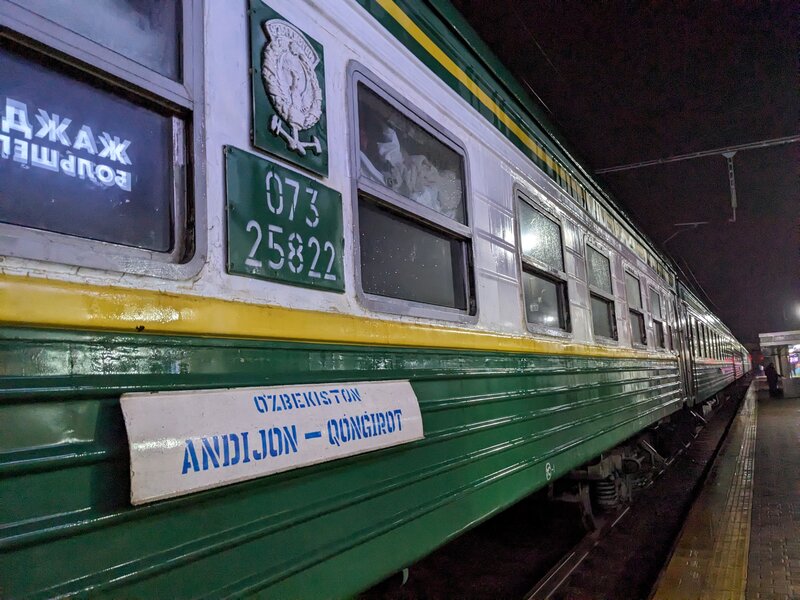
The Bukhara-bound train was sitting in the rain, and everyone in it was already asleep.
It was only a three-hour trip to Bukhara, so I woke up at around seven to not miss my stop. It wasn’t hard to wake up–the rain had stopped and the dull daylight of an overcast day was already everywhere in the car. With nothing to do, I tried to read a book that I had begun reading when I left home, but it had been a while and I had already forgotten half of the characters. I always pictured myself reading a lot on the trains and buses on this trip. But the reality was that I was instead always planning what to do next or was knocked out. There was no schedule on the road, and the lack of routines was wreaking havoc on basic things. In moments like this, I missed the predictable life back home. But funnily enough, when I was leading an ordinary life full of schedules and routines, I missed being on the road. Maybe we can’t always have it both ways.
Suddenly, an unusual scene took place in my car and interrupted my brief attempt at reading. An old man who was in the bed right below mine broke out a traditional guitar and started singing and playing. At first, he was just warming up by playing a few notes and bantering with fellow passengers who tried to encourage him. And then he sang an entire song, while rocking the two-string guitar that looked similar to the ones I saw on the streets of Xinjiang. In no time, some curious passengers began surrounding the old man’s seat. I listened to the song for a while from my bed and climbed down to join the audience that was forming around the impromptu performance.
I am not sure how to describe the song. It was hypnotic. It consisted of simple notes that kept on repeating, and the old man chanted in a deep voice. He was something of a showman, too. When I tried to take a photo of the act, he made a sudden forward motion toward my camera while playing the song, as if he were showboating. While everyone laughed and cheered at his theatrics, he simply smiled and kept playing the song. I was hooked, although I didn’t understand a word of what he was singing about.
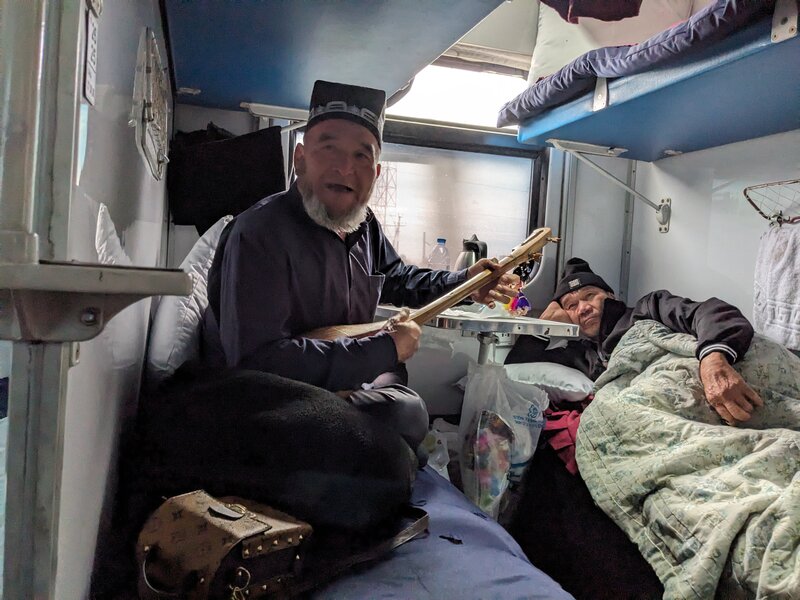
The train slowly pulled into Bukhara as the old man enticed everyone with his two-string guitar and magical voice.
As the catchy tune of the two-string guitar repeated over the entrancing and low-pitched chant, the train gradually slowed down and passed hundreds of oil tankers of freight trains standing still under the dull sky. The old man’s song wrapped up as the train eventually came to a stop at Bukhara station. It looked like it was going to be a pleasant day. The sky was slowly clearing, and the patches of wetness on the platform floor were drying up.
I walked out of the station, and the crowd from the train quickly disappeared. Since I was new to the city, I figured I’d just head to the center and try to find something to do there. After riding for an hour on a small bus, I got off at some random bus stop that was supposed to be close to the old city. It was much colder than I had expected, and my lack of warm clothes was becoming a problem once again. Dressed in a worn-out down jacket over a hoodie, I knew that walking around in that cold wasn’t going to help with my sore throat. In addition, there was nowhere to get warm or comfortable because all the shops and restaurants were closed even though it was almost 9:30AM. I had nowhere to go, and my sleeper train to Tashkent that night felt ever so distant. I wondered what I’d do for the next twelve hours. I just hoped that the weather would get warmer and my sore throat would come under control.
The center of the old town was interesting, but something about it bothered me again. Maybe it was just my luck not to be able to sit back and enjoy the good things like a normal person, but I couldn’t help but feel that something was off. It was a different feeling from the one I had in Samarkand. The pretty buildings of Samarkand irked me because they looked too perfect. On the other hand, the pretty buildings of Bukhara troubled me because they felt artificial. The supposedly historical landmarks that surrounded me, upon a closer look, were actually repurposed as souvenir markets, fancy coffee shops, or clothing stores. Even the places that managed to survive this fate were being encroached on all sides by the swanky restaurant booths, tables, and vending machines.
As I looked at the madrasas and religious edifices smothered by sprawling businesses, I felt a certain distance between myself and those ancient structures. Partially disillusioned, I walked over to the edge of the central square where I discovered a ruin of an old caravanserai–a resting place for caravans in the olden times. Did weary caravans really come to this very spot where I was standing? Did they bathe in that nearby hauz and walk around the very buildings that surrounded the place? The obvious reminder of the Silk Road stirred up some connection to the place that had just moments ago felt so distant.
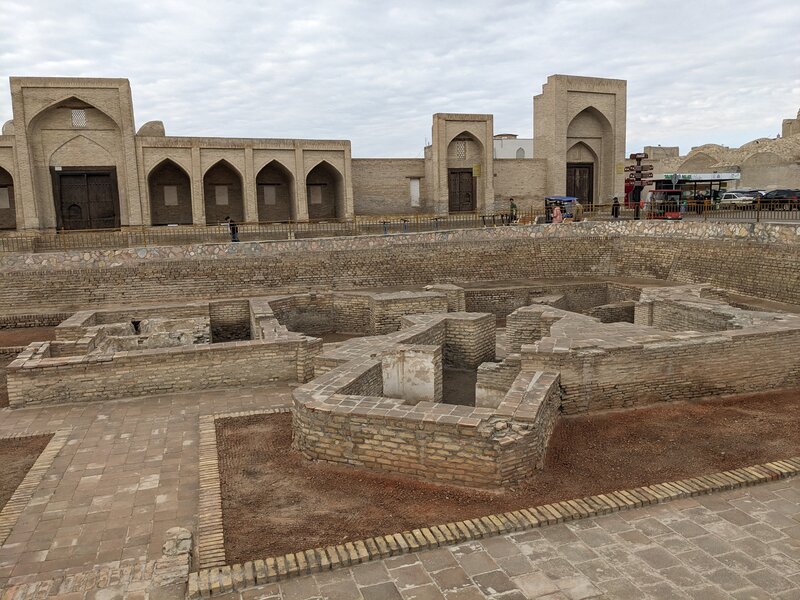
A ruin of old caravanserai helped me feel less estranged by the artificial appearance of the city.
I started walking down the old streets full of shops and tourists. Maybe the city and I got off on the wrong foot. Maybe I was too quick to judge and dismiss what it had to offer, without making an effort to appreciate it. In fact, Bukhara did have some interesting places. The old city had imposing mosques with elaborate decorations, and a huge fortress that looked pretty ancient. But again, I couldn’t shake this nagging feeling that I didn’t know exactly what to take away from these pretty buildings. The mosques and madrasas blended into the memories of countless other similar buildings that I had already seen in the past few days.
There was a ruin on top of the fortress, just like the one that I walked around in Samarkand the other day. In the distance from that ruin, I could see the famed local mosque with the huge tower, looking just like the ones I saw in Samarkand. Pointing my camera at them once more, I realized it was rather pointless. It might well have been that I was too uncultured to recognize the apparent marvels that lay before my eyes, or that I was just too tired. Either way, something seemed off to me, and it felt as though nothing short of magically summoning the Silk Road caravans onto these very streets was going to restore my interest in the place. I stood there at the fortress and gazed at the picturesque buildings of the old city. They felt as far from my heart as they appeared to my eyes.
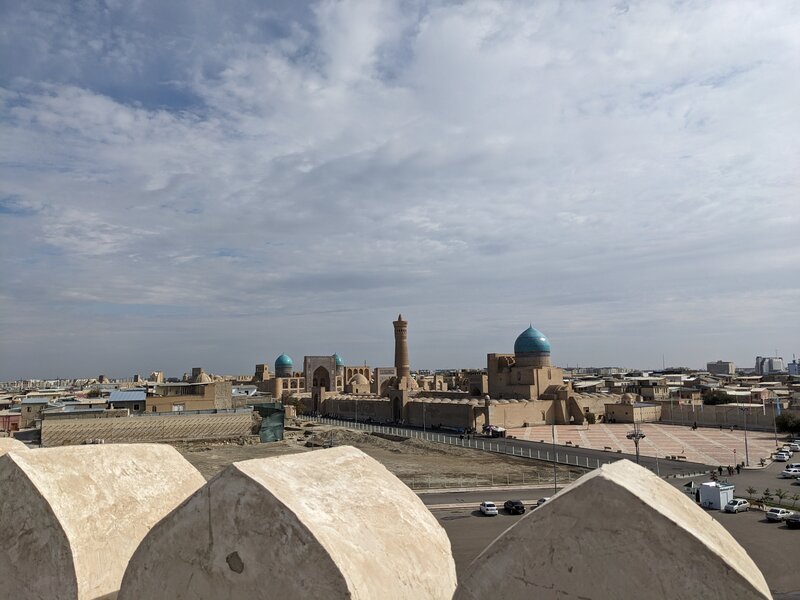
The picturesque buildings of the old city felt as far from my heart as they looked from the top of the old fortress.
I walked around the rest of the old city aimlessly, trying to understand the inner beauty of all the magnificent buildings. After many hours, my legs and shoulders were screaming for rest, so I sat down in front of a tall mosque to cool down a little. The facade of the mosque had these wooden columns that made it look different from all the other mosques I had seen in Uzbekistan. With those wooden columns, the mosque looked similar to the ones I saw in Kashgar, but only bigger. I sat there listening to the loud call to prayer echoing from the loudspeakers, soaking in the sunshine that was finally poking through. The afternoon was still somewhat cloudy, but there was a touch of blue in the sky. The weather wasn’t all that cold anymore.
Suddenly a local man peddling street food approached the bench and offered some samsa to me. I wasn’t too sure about experimenting with street food before the night train ride and also didn’t want to spend too much money. So I passed. But there was a Belgian grandma sitting next to me, and she bought two and offered me one. “Here,” she said, “Would you like one?” Naturally, I thanked her and took the bag. While trying the samsa, we made some small talk about what we thought about Bukhara. I wasn’t sure how to describe my ambivalent feeling toward the city. So I just said that Bukhara was such a beautiful and historic town, and she agreed. I ate half of the samsa and put the rest in my backpack, figuring it would make a good snack on my train ride to Tashkent that night.
When the prayer ended, the locals dispersed from the mosque, and the grandma also left. It was only 4:00PM and I still had plenty of time before my night train to Tashkent. I started roaming the familiar yet distant streets of Bukhara once again. While I was passing the large square near the fortress, I heard the sound of a ping-pong ball. Two local kids were playing table tennis near the fortress walls. I stopped nearby and watched them play. They noticed me, and we laughed together over the moves unfolding on the table. When the game ended, one of them turned to me and said, “Khochesh poigrat?” (“Wanna play?”) I had nothing better to do, so I said “Konechno, davai” (“Sure, let’s go”). I dropped my backpack on the other table nearby and started playing. The kids had some skills. One of them, in particular, kept trying to sneak in a move where he would play a long ball, followed by a very short ball landing just barely across the net. He actually got me a couple of times. We played for a while, taking turns and playing the winners.
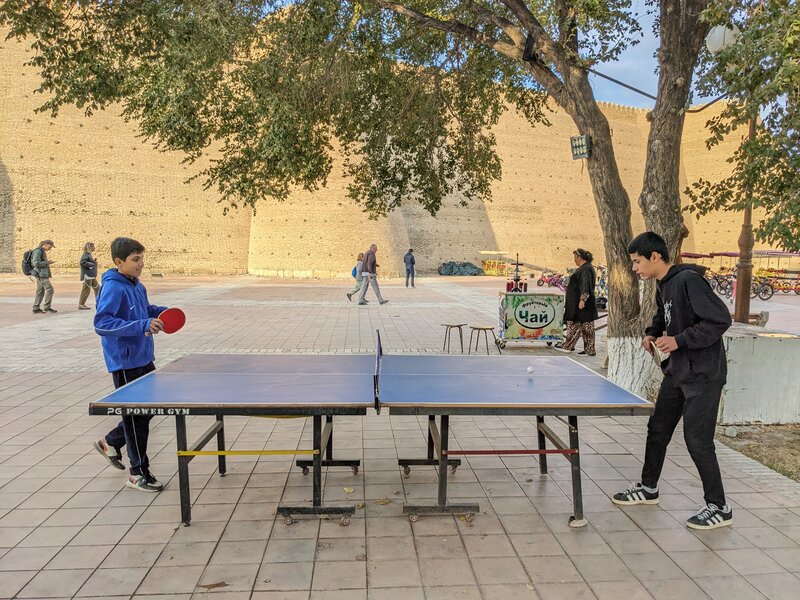
The table tennis games near the fortress felt like the closest thing, among everything I saw that day, to being real.
After a few games, the kids had to leave and our friendly matches came to an end. The sun was starting to set, and I noticed that the fortress walls were taking on somewhat different colors. Looking at this change of scenery, I decided to give the pretty buildings of Bukhara another chance. Maybe, under the setting sun, they would reveal a side that I was too blind to recognize at first.
The mosques and the madrasas were now bathed in the orange hues of the setting sun piercing through the cloudy sky. They were quite pretty. But no matter how beautifully rays of the sun lit up those buildings and their ornate decoration, there was still that air of artificial quality all around those historically important places. Everything was so decently packaged, served up and ready to be consumed without the slightest effort. I still felt emotionally detached from it all. The closest thing that I experienced to being real that day, I thought, was playing those table tennis games with the local kids.
I walked toward the northern part of the city trying to look for something raw and real. The sun was setting over the back alley behind brick houses that were in the color of sand. The streets were narrow and I had to make myself flat against the sandy walls every time a vehicle tried to pass me. I kept on walking, but there was nothing much in that part of town. There were just houses and a few smaller landmarks that no one really cared enough to visit.
I was pretty much the only person on those quiet streets. I didn’t mind the solitude, but there was a problem–I needed to use the bathroom and there was virtually nothing there. For once, I actually missed the touristy part of the city. Since I had already come too far, I just continued north until I reached a main road where I could finally see some activities. There was this school on the side of the road. Sort of desperate, I walked in there and directly asked, “Ya turist. U vas est tualyet?” (“I’m a tourist. Do you have a toilet?”) The security guard was pretty nice about my random request. He walked with me to one of the teachers to get her permission, and let me use the facility. When you are roughing it without a place to stay, sometimes a trip feels like nothing but a constant search for the bathroom, interwoven with some brief sightseeing.
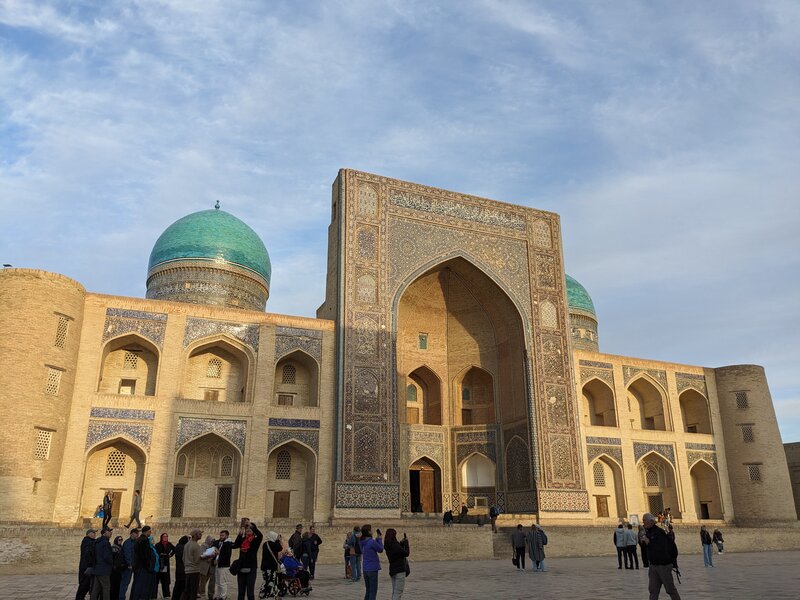
Mosques and madrasas were bathed in the orange sunset, but they still felt so distant.
After that bathroom break, I really didn’t know where to go anymore. I walked back to the old city for the last time as dusk fell all around. I didn’t expect to see anything new there, because I had practically walked around everywhere that day. Yet the city surprised me with a new look. The mosques, the madrasas, the fortresses, the towers, the coffee shops, the fancy restaurants all had pretty lights on, and they looked so flawless and cheerful. But what for? All the lights and the splendid presentation lost their allure in my eyes.
Away from all the commotion, a small moon perched in the dark-blue sky, clinging for dear life right at the edge. It looked so insignificant and helpless compared to the vast night sky that surrounded it. Looking at that moon, I realized that all I wanted to do was to walk away from the hype and all the ostentatious displays around me. I walked past the waterfront restaurants and fancy gift shops, with a singular purpose of getting away. After a while, when I entered quiet streets unadorned by flashy lights or decorative shop fronts, I looked back at the silhouettes of the city once more in the hope of catching a last glimpse of the famed mosques and the tower. But they were nowhere to be seen anymore. Only the city’s neon signs and night lights burned loudly in the distance. The small moon had apparently followed me all the way there. I turned back and continued to walk.
Rain drizzled off and on, and with it came the cold air. I didn’t feel too well as my sore throat was really acting up. Every time I swallowed something, it would hurt. The worst thing about it wasn’t the discomfort or pain, but the forthcoming thought that somehow the sickness would derail me from the path. I still had some salt left over from Samarkand, so I made salt water and did my best to treat the sore throat. I didn’t have any temperature, but my nose was constantly running and it was annoying. I took a Yandex taxi and arrived at the Bukhara station by 8:00PM. It cost me 21,500 Sum ($1.66) but I didn’t want to take a gamble on a bus because the train was going to leave in an hour. The platform was cold and had wet patches all over from the intermittent rain. Soon my train pulled into the platform, and I began the nine-hour trip back to Tashkent.
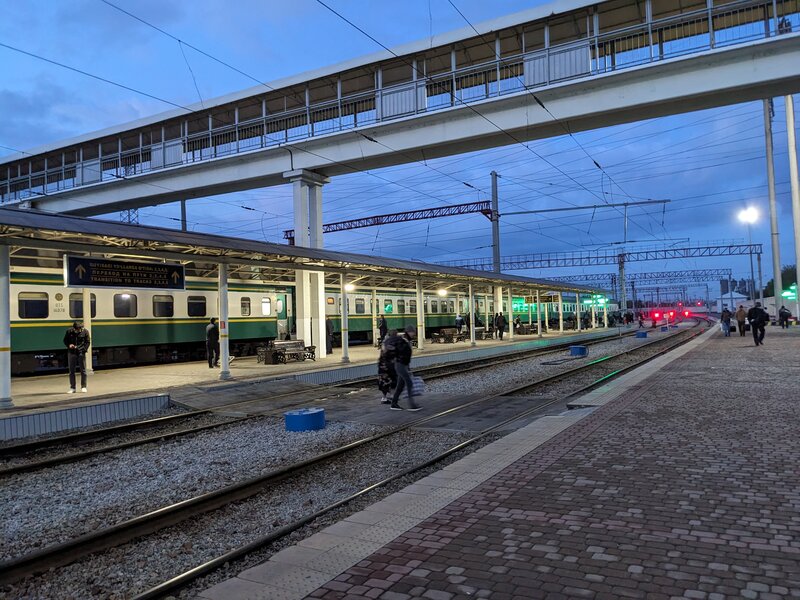
As I was leaving Bukhara in that cold evening, I battled the thought of sickness derailing me from the my path so dear to me.
I lay down in a bunk bed next to the aisle and thought about how I would recover from the sore throat and what I would do in Tashkent. When I was lost in the thoughts, a young man from a bed next to mine tapped on my shoulder. He asked, “Brat, mozhno ya ego odolzhu?” (“Bro, can I borrow it?”), pointing to my power bank. He showed me his phone and told me that it died as it had no juice left. I felt for him because the third class carriage that we were in didn’t have any electricity outlet, and my phone and camera were also running really low on battery. I wanted to save the power, because I would have nowhere to stay in Tashkent once I got there–I needed to stay outside the entire day and until the 3:20AM flight to Baku the following morning.
With all these calculating thoughts going through my mind, I blurted out, “Nyet, izvini,” (“No, sorry”) and tried to explain myself in English, “I don’t have enough.” Crestfallen, the guy retreated to his bed with his dead cell phone. And suddenly I came to my senses and posed myself that same question that I had formed in Urumqi: “People are kind. Can I be just as kind to others?” Sam didn’t ignore my plea for direction in that cold morning when I was lost in Urumqi. People paid for my bus fare when I was almost getting kicked off the bus. Evan and my Chinese friends helped me cross Irkeshtam and even paid for my transport. Suiun drove me for seven hours across Kyrgyzstan and let me sleep in his house. Surely I could let someone use my battery to revive their cell phone. I felt remorseful.
“Brat,” (“Bro”) I looked over my bed and called the fellow passenger, handing over my power bank. “Dvadtsat minut, khorosho? Mne tozhe nuzhen” (“Twenty minutes, right? I also need it”). “Spasibo, brat!” (“Thanks, bro!”) the guy thanked me, plugging in his dead phone to the battery. I wasn’t sure what I was going to do when I ran out of battery the next day, but I thought I’d worry about it later. Sometimes, we just have to do the right thing although it’s hard. To kill the boredom, I resumed my attempt at reading from where I’d left off that morning. However, the identities of the characters still evaded me and I just couldn’t focus. I was also in bad shape after walking around Bukhara for the entire day in my condition. I kept putting the back of my hand on my forehead to check whether I had a temperature. I wasn’t sure anymore whether I did. The lack of certainty was worrying, as I really couldn’t afford to be sick. With many thoughts crossing my mind, I drifted off.
The train stopped at some random station at around midnight, and the noise of the passengers woke me up. The lights were off, the bed was uncomfortable, and the chilling breeze was leaking through the window beside me. I was really concerned that I wouldn’t feel better the following morning. With my mind racing, I suddenly started noticing that there was hardly any room to sit up or even raise my arms in my bunk. That compactness, which had never bothered me before, really started to freak me out. I had never felt that way. I kept reminding myself that it was all in my head, and that things would be fine. I tucked myself in tightly in the thin bedsheets, wrapped some clothes around my neck to keep warm against the cold breeze, and let the clatter of the train put me back to sleep as it slowly started moving again.